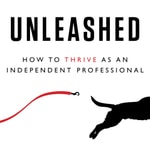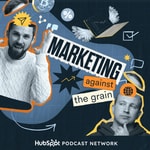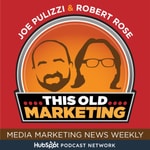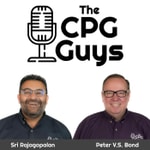Unleashed - How to Thrive as an Independent Professional – Details, episodes & analysis
Podcast details
Technical and general information from the podcast's RSS feed.

Unleashed - How to Thrive as an Independent Professional
Will Bachman
Frequency: 1 episode/5d. Total Eps: 597

Recent rankings
Latest chart positions across Apple Podcasts and Spotify rankings.
Apple Podcasts
🇬🇧 Great Britain - careers
26/07/2025#89🇬🇧 Great Britain - careers
19/07/2025#94🇨🇦 Canada - careers
25/06/2025#82🇨🇦 Canada - careers
01/05/2025#90🇬🇧 Great Britain - careers
18/04/2025#60🇨🇦 Canada - careers
05/04/2025#76🇫🇷 France - careers
05/04/2025#92🇬🇧 Great Britain - careers
05/03/2025#64🇨🇦 Canada - careers
01/03/2025#84🇬🇧 Great Britain - careers
28/02/2025#69
Spotify
No recent rankings available
Shared links between episodes and podcasts
Links found in episode descriptions and other podcasts that share them.
See all- https://www.elevatiq.com/
742 shares
- https://www.partneringleadership.com/
646 shares
- https://mahantavakoli.com/
630 shares
- https://twitter.com/
1348 shares
- https://twitter.com/dvassallo
17 shares
- https://twitter.com/jimmyasoni
16 shares
RSS feed quality and score
Technical evaluation of the podcast's RSS feed quality and structure.
See allScore global : 38%
Publication history
Monthly episode publishing history over the past years.
583. Christian Hyatt, Growing a Cybersecurity Firm
lundi 12 août 2024 • Duration 32:18
Show Notes:
Christian Hyatt, Founder of Risk3Sixty, discusses the top three or four things that chief information security officers at sub-enterprise firms are most worried about right now. He explains that these concerns include the business environment, threat actors, cybersecurity regulation, nation-state actors like Russia and China, and phishing campaigns. He also highlights the unique bridge between cybersecurity and information technology coming to a head with the recent CrowdStrike incident.
Advice to Clients on Cybersecurity
Christian suggests that independent consultants should ask clients questions or warning signs to raise their concerns and consider consulting a cybersecurity expert. He suggests that clients are looking for someone who is a good listener and not operating off fear, uncertainty, and doubt. By listening to clients' needs and concerns, consultants can offer advice on implementing best practices on their existing toolset and spreading security awareness. Christian emphasizes that many big enterprise tools, such as Office 365 and Google Suite, have built-in security, covering many bases. Independent consultants should listen for how well implemented their tools are, listen for business problems they have, and offer security assurance. Offering advice on implementing best practices and spreading security awareness can help firms understand how security is impacting their business and make informed decisions about investing in security measures.
Cybersecurity Due Diligence
In the context of due diligence, Christian states that it is important to consider the company's internal infrastructure, including its cloud-based and on-premises systems. This can help identify potential red flags and ensure the company's sustainability and scalability. For example, if a product company is being acquired, it is crucial to ask about its application security, product security, and scalability. Additionally, understanding the company's mastery of its own product and its ability to scale without the team is essential. Another key factor to consider is the company's internal infrastructure, whether it is cloud-based or on-premises. Integrating with the acquiring firm can impact the cost of the process.
Cybersecurity for Independent Consultants and Boutique Firms
Independent consultants and boutique firms with a few employees should also take cybersecurity precautions. Some good tools for small businesses include G Suite or Office 365, which have built-in tools for file share sharing, email security, and internal messaging. These tools help protect against cybersecurity attacks that originate from email. Installing antivirus tools like CrowdStrike and Sentinel can help prevent attacks at the endpoint level. Blocking and tackling security processes, such as using file sharing platforms like OneDrive or Dropbox. It’s also important to identify areas where money changes hands and take protective measures. Creating an offline backup of key files once a month can help protect against ransomware attacks. Office 365 or G Suite can also be used to store files in the cloud, with tools like spanning for Office 365 creating backup copies of cloud storage. Exploring the full suite of options available to small business owners can help them get coverage for their biggest risks.
Employee Training on Cybersecurity
The conversation turns to the importance of raising employees' awareness of phishing dangers. He recommends using tools that periodically send white hat phishing messages to test employees' skills. Christian suggests that small businesses should focus on creating a culture of awareness and vigilance, letting candidates know about potential scams and asking questions if they feel uncomfortable. There are several tools available for security awareness training, including Curricula. Additionally, he suggests using YouTube videos as part of training, as they can be more effective than expected. By implementing these tools, businesses can create a culture of vigilance and prevent employees from clicking on suspicious links.
The Origins and Growth of Risk 3 Sixty
Christian started his firm as an independent consultant eight years ago, with a trajectory of impressive growth. He initially had one client, a $30,000 one-off engagement, but from there eventually grew the business to 60 clients. Christian shares a few of the tactics behind the growth, including his shift towards cybersecurity. He focused on a few cybersecurity services that had great demand and packaged them as multi-year deals, and recurring revenue. He also learned that organizations have huge compliance requirements. They built a SaaS platform to help them manage the information. They invested in the SaaS platform and started selling it as a subscription. Today, their services are tech-enabled services, where companies often outsource their entire programs to them due to the need for human labor. Christian made strategic decisions early on, scaling the business around recurring revenue streams, over-delivering, and building a good culture. He centered around those activities that felt risky at the time, saying no to big contracts that didn't fit within his revenue stream. He also explains how a book by Gino Wickman, Traction, and The Entrepreneur Operating System, helped him shift the responsibility for business development off of his shoulders to other members of the firm.
Recruiting Talent for Risk3Sixty
Christian hired a West Point graduate to become an ops manager. He believed that hiring great people was a risky move but ultimately helped build a sales function and complement the founder's role. The company also hired a strategic partner with Georgia Tech to hire top students. Despite the early hires, the success of the company can be attributed to the smart people who pushed the founder to think more like a leader and helped him see the future. The company's success can be attributed to the excellent people who helped him make decisions that he wouldn't have made on his own.
The Structure of a Successful Company
Christian’s company has 60 employees, and a top-down structure consisting of an Executive Leadership Team (ELT) consisting of six members: the CEO, President, Head of People, the Chief Operating Officer, the Chief Revenue Officer, and the CTO. The CEO focuses on mission and metrics, breaking down the vision into KPIs and measurables, and making sure everyone understands it. He also works on brand equity through social media, podcasts, and speaking events. He also talks about how he approached pay bands and benefits to attract talent and maintain retention. The CEO manages the ELT, ensuring they are motivated and have the same vision. An initiative Review Board was created to address pent up projects or initiatives that were not previously budgeted. This allowed people to request new projects or initiatives outside of budget season, providing a pressure relief valve for strategic initiatives.
A Successful Marketing Philosophy
Christian's marketing philosophy focuses on teaching good concepts and adding value to people, rather than being an influencer. He uses content such as videos and white papers to add value and engage people, leading to more leads and engagement. He initially used LinkedIn outbound to find open job opportunities and reach out to hiring managers, but found that more people would ignore him than respond. Christian shares his teaching methods on LinkedIn, YouTube, and a newsletter. For cybersecurity-focused content, he hosts a weekly cybersecurity executive brief on YouTube. He also has a marketing team that helps with content creation, and practice leaders who produce content regularly, called media properties, on LinkedIn. Each member of the team has a dedicated content pillar, and it's up to them to create content that resonates with the audience. A marketing team supports them with video editing and accountability. Christian initially did it all himself, using a video editor tool and recording videos and writing white papers.
Timestamps:
03:14: Cybersecurity precautions for independent consultants and small firms
08:10: Cybersecurity awareness training for small businesses
13:51: Growing a consulting firm through strategic decision-making and recurring revenue streams
18:19: Scaling a consulting business by hiring a leadership team
22:24: Leadership decisions and team structure
26:55: Using LinkedIn for business growth and content creation
Links:
-
Connect with Christian on LinkedIn: https://www.linkedin.com/in/christianhyatt/
-
Check out his book: https://risk3sixty.com/stos
Unleashed is produced by Umbrex, which has a mission of connecting independent management consultants with one another, creating opportunities for members to meet, build relationships, and share lessons learned. Learn more at www.umbrex.com.
582. Strategy Mavericks: Disrupting Traditional Approaches to Business Strategy
lundi 5 août 2024 • Duration 54:13
Show Notes:
In this panel discussion, Lisa Carlin, director of Future Builders and author of the newsletter Turbocharge Weekly, and strategy execution specialist introduces the three panelists, who discuss the challenges of traditional strategy development, including volatility, uncertain business environments, and significant digital and AI disruption. The panelists, Will Bachman, Founder of Umbrex, a global community of independent management consultants, Alex M.H. Smith, breakthrough strategist and author of No Bullshit Strategy, and Rob McLean, investor, philanthropist and co-author of two books on strategy, discuss the challenges of traditional approaches to business strategy.
The Problem of Business Strategy
Rob emphasizes that, previously, strategies were deterministic and assumed certainty in business plans. However, increasingly, there is global uncertainty, and risk and probability should be included in a strategy. He mentions that there are assumptions about uncertainty that don’t hold true. He also highlights the fast change and that the cadence of strategy is changing, but despite this, many enterprises are locked into three and five-year plans. Alex explains why he believes that many businesses lack understanding of effective strategy development and deployment. He emphasizes the importance of making precepts accessible, engaging, interesting, and usable for medium-sized businesses. He believes that traditional strategy is not bullshit but has limited purchase as it doesn't address the needs of small and medium-sized businesses. Will shares his experience with 500 conversations per year with clients seeking consultants, and he shares the main trends in what clients want from consultants and states that it has not changed dramatically over the years, but he also stresses the need for alignment, clarity, and action. Alex identifies the importance of substance and the ability to convert to action. He mentions the difficulty of achieving engagement, encouraging action, and the underemphasis of style in communications. He suggests thinking about strategy as a motivational discipline. Alex suggests that focusing more on sexing up the strategy can make a significant difference in making progress. He suggests that if strategy is viewed as a motivational discipline, it is essential to motivate people to do it. He believes that making the strategy “sexier” will bring stronger results in engaging and motivating buy-in.
Problem-solving, Strategic Intent and Strategic Development
Robs talks problem-solving as a driver of strategic development. The identified problems are viewed through different lenses to achieve a 360-understanding. He mentions the greater premium on new data, and on trials and experiments, and mentions strategy that includes peeling back layers of uncertainty, putting people in a position where they can make decisions and evolve the strategy. He uses an example from Amazon to illustrate this. He also points out that strategic intent is often confused with strategy, as strategy is an integrated set of actions that build value and competitive advantage. Rob shares his experience with the concept of continuous development, and how businesses have changed the timeline on strategic development and clarity on the future. Alex states that medium-sized businesses face a challenge in understanding strategy literature, as it is often constructed to be relevant to large, polar businesses like Amazon. This makes the strategy literature inaccessible for single-brand founders or CEOs, as it is often too broad. This gap in communication between the concerns of large companies and those running small businesses makes it difficult for the latter to effectively develop and communicate their strategies.
Business Strategy in the Context of Technology and Culture
The discussion revolves around the impact of AI on consulting and strategy building. Lisa mentions a top-rated technology podcast, which emphasizes that the number one difference will be strategy and that the most significant impact of AI will be on product managers. Will builds on the use of AI for strategy consultants. He explains the difference between skills and services that rise in status and which ones are lower in status and where using AI is applicable. He offers examples on both using an energy storage company as an example.
Dark Room Consulting
Lisa brings the discussion towards “dark room” consulting where the consultants and executives operate in private before disclosing the strategy to the company at large. Alex explains why he prefers this approach, stating that while it may not be politically beneficial, it can provide a sense of involvement and ownership for a radical, meaningful move. However, this approach can also lead to a slightly autocratic approach, as seen with Steve Jobs and Elon Musk, who were both successful business leaders but also tyrants in their own businesses.
Rob talks about the workers’ strategy as bifurcating, and he shares an example from McKinsey where they used AI, and that employing “dark room” tactics can work well however working closely with the front line is also important in strategy building. Will shares a story from his days as a submarine officer that clearly demonstrates the benefits and need of front line work a consultant needs to do. This also involves gathering information, and Alex adds how this allows everyone to feel involved, while maintaining the core idea and decision-making back to the people who lead the company. While this approach may not be as democratic as some may prefer, it is essential for businesses to adapt and evolve to stay competitive in today's competitive market.
Q&A Session
The conversation opens up to questions and panelists are asked to share one recommendation. Rob suggests a problem-solving approach that recognises uncertainty, a tolerance for ambiguity, and taking steps forward feeling the stones beneath the feet. Alex states that, if a change in results is desired, changes to strategy must be made. Will focuses on implementation, stating that strategy implementation, or execution, or transformation is in high-demand and notes that increased resources in these directions are needed to make the change happen. The conversation covers a variety of areas including strong leadership vs. dictatorship, helping people feel comfortable with uncertainty, the need for monitoring and evaluation improvement during implementation, and the importance of measuring the impact of their work, particularly in implementation. And finally, the audience shares their key takeaways from the discussion.
Timestamps:
05:43: Strategy development for small to medium-sized businesses
10:11: Strategies for effective communication and implementation in business
17:01: Strategy in a rapidly changing world, with a focus on dealing with uncertainty and ambiguity
25:08: Strategic planning for businesses of varying sizes, with a focus on the challenges of scaling and the importance of industry knowledge
31:04: The impact of AI on strategy development and execution
37:13: Strategy development, emphasizing the importance of gathering insights from frontline employees and changing meaningful aspects of the business to improve results
42:46: How to handle uncertainty in business strategies
47:33: Implementing strategies with uncertain outcomes
Links:
Connect with the other two panelists on LinkedIn:
Robert McLean: https://www.linkedin.com/in/robert-mclean-412268ba/
Alex M. H. Smith: https://www.linkedin.com/in/alex-m-h-smith/
Connect with Lisa Carlin on LinkedIn Connect on LinkedInFor for more like this, please subscribe to Turbocharge Weekly: Fast-track your strategy. 3 tips in 3 minutes from 50+ implementations. Join 8,000 leaders now. https://info.theturbochargers.com/register-turbocharge-weekly
Unleashed is produced by Umbrex, which has a mission of connecting independent management consultants with one another, creating opportunities for members to meet, build relationships, and share lessons learned. Learn more at www.umbrex.com.
573. Ron Razmi, AI Doctor: The Rise of Artificial Intelligence in Healthcare
lundi 20 mai 2024 • Duration 43:41
Dr. Ron Razmi discusses his book, AI Doctor: The Rise of Artificial Intelligence in Healthcare, which focuses on the applications of AI in various areas of healthcare. Ron talks about AI as a foundational technology that uses statistical methods to analyze data and understand its meaning. It can be applied to various areas, such as coding and documentation, and can create algorithms to analyze heartbeats and detect abnormal rhythms.
AI Use in Diagnostics
In diagnostics, AI can be helpful in analyzing clean structured data, such as radiology files from CAT scans or MRIs. AI can be trained to identify bleeding or abnormalities on these scans, but it must be trained on specific abnormalities. Currently, AI excels in radiology due to the digitized and structured data, but it's not as effective in narrative formats. Ron states that AI's applications in healthcare are vast and deep, and while it's still in its early stages, it has the potential to revolutionize various sectors, including healthcare.
AI Tools in Radiology and Triage
AI is increasingly being used in various fields, including radiology, dermatology, and sound AI. In radiology, AI tools are helping radiologists identify potential issues that might have been missed in traditional workflows. There are applications that read CAT scans for bleeding and stroke in acute settings, allowing radiologists to quickly identify and treat stroke patients. This helps in regaining function and ensuring patient recovery. AI can also aid in triage, prioritizing tasks based on urgency.
AI in Dermatology
In dermatology, AI applications can help diagnose skin lesions. Additionally, sonar technology can be used to monitor people's activity and detect falls. This passive data collection method allows AI to analyze the signals and take action, reducing the need for manual data entry and manual data input. This technology is particularly effective for elderly individuals who may not want to be monitored with cameras, as 50% of falls occur in the bathroom. This technology is particularly useful for those who prefer to stay home but still need constant monitoring, such as those in assisted or independent living facilities.
AI in Cardiology
In cardiology, AI tools can help read EKGs, which are crucial for diagnosing heart conditions. Historically, algorithms have been used to read EKGs, but they were often basic and inaccurate. AI has shown great promise in finding abnormalities on single lead data collection, as it can discern the rhythm of an EKG from a live core or smartphone application. This field-based data collection could significantly reduce the simple analytic and downstream work needed by clinicians in the medical staff.
AI in Therapeutics
AI takes action in therapeutics, such as providing assistance to patients with mental health issues. AI chatbots can interact with patients who need help and provide frontline assistance until they see a mental health professional. Generative AI has improved natural language processing capabilities, which has been a problem area for AI in healthcare due to the heavy use of medical jargon in doctor's notes. This will allow for more efficient interactions with healthcare consumers and better guidance in their care. However, there is still much work to be done in this promising area.
Technology and Medication Adherence in Healthcare
The conversation turns to medication adherence, which is a significant problem in healthcare. Long-term studies show that people who have had a heart attack are more likely to stay compliant with their medications, with the refill rate for statins being the highest documented rate. However, most people do not follow their prescription advice. Technology is part of the solution to this problem. AI technology can potentially analyze data and interact with patients at the appropriate moment to ensure they are aware of the needs, issues, and dates of medication use or the lack of, which is crucial in healthcare.
How AI Helps Doctors
AI applications in healthcare can help alleviate the burden of documentation work for physicians and nurses. One example is the use of AI in critical care settings, where doctors often spend time typing notes into the electronic health record, which can lead to missed information and negatively impact the quality of care. AI can also analyze conversations using natural language processing, which can identify the meaning of words and improve communication. For example, AI can listen to conversations and extract key elements that need to be documented, allowing doctors to focus on the patient and generate notes in their preferred format. AI can also perform downstream tasks, such as prescribing medication, making referrals, and creating prior authorization letters. This could save time for medical staff, preventing them from seeing more patients and making them less productive. Another use case could be for AI to assist nurses in creating notes for patients based on interaction with them, reducing the time spent documenting. This could make a significant difference in the quality of care and well-being since it allows medical professionals to focus on the patient instead of taking notes.
Evaluating AI Healthcare Applications
Ron’s book goes beyond cheerleading and emphasizes the business and clinical barriers to adoption. He talks about the importance of evaluating the business model of AI products or applications, considering the incentives of buyers and the potential for job loss or revenue reduction. As an investor, he suggests considering the pain points that AI could address, such as staff shortages and burnout, and how AI could help medical centers and pharmaceutical companies improve their clinical trials. Ron also discusses the importance of understanding the value proposition of AI products in medical settings. He shares his experience as an investor in the healthcare AI space, advising companies and funds on identifying great use cases and evaluating barriers. Ron recommends reading sources like healthcare AI digests, health tech news, and interviews with experts to stay informed about trends and the latest AI applications.
Timestamps:
04:00 AI applications in radiology and dermatology, including AI-assisted diagnosis and triage
10:54 Using AI to analyze passive data collection from sonar/radar in indoor environments for health monitoring, including fall detection and heart rate measurement
15:12 AI in healthcare, particularly in diagnostics and therapeutics
21:22 Using AI technology to improve medication adherence
26:40 AI applications in healthcare, including documentation assistance and quality of care
34:41 AI in healthcare, investment considerations, and product evaluation
39:44 AI in healthcare with a former doctor turned investor
Links:
LinkedIn: https://www.linkedin.com/in/ronald-m-razmi-md-2b55b8/
The Book: AI Doctor: The Rise of Artificial Intelligence in Healthcare
Unleashed is produced by Umbrex, which has a mission of connecting independent management consultants with one another, creating opportunities for members to meet, build relationships, and share lessons learned. Learn more at www.umbrex.com.
479. Justin Nassiri on LinkedIn Profile Managed Service
jeudi 24 février 2022 • Duration 34:43
Justin Nassiri is the founder and CEO of Storybox Inc, a McKinsey alum, and president of Executive Presence, a company that helps executives become thought leaders on LinkedIn. He has a B.S. in Electrical Engineering from the Naval Academy, he is a qualified nuclear engineer, and he is a graduate of Stanford University’s School of Business. In today’s episode, Justin talks about his business and how he helps executives build a following on LinkedIn. You can learn more about Justin’s company at ExecutivePresence.io or reach out to him on LinkedIn.
Key points include:
05:26: Common mistakes executives make
10:06: Social rules on LinkedIn
15:46: A case study
20:21: Content strategies
Unleashed is produced by Umbrex, which has a mission of connecting independent management consultants with one another, creating opportunities for members to meet, build relationships, and share lessons learned. Learn more at www.umbrex.com.
478. Brad Schneider on Find the Data You Need
mercredi 23 février 2022 • Duration 13:34
Key points include:
01:12: How the Nomad Data network works
04:13: The vendors of data - who they are
06:45: The company pricing model
08:35: Surprising data sources
Unleashed is produced by Umbrex, which has a mission of connecting independent management consultants with one another, creating opportunities for members to meet, build relationships, and share lessons learned. Learn more at www.umbrex.com.
477. Tushar Shah on Intro to Search Funds
mardi 22 février 2022 • Duration 46:11
Key points include:
- 00:30: What a search fund is
- 10:51: Who can apply for the fund
- 15:53: Examples of business and services acquired
- 28:12: Assembling a pool of investors
Unleashed is produced by Umbrex, which has a mission of connecting independent management consultants with one another, creating opportunities for members to meet, build relationships, and share lessons learned. Learn more at www.umbrex.com.
476. Paul Millerd on the Pathless Path
lundi 21 février 2022 • Duration 47:13
Paul Millerd is a McKinsey alum, modern-day nomad, entrepreneur, and author of The Pathless Path - Imagining a New Story for Work & Life. Paul provides online courses on strategy consulting and freelance consulting. He is also the creator and contributor of the popular website, Boundless, a site that explores how to have a better relationship with work, and a podcast that is designed to help creatives reimagine work. In today’s episode, Paul talks about his book. You can order the book and learn more about Paul’s programs or sign up for his newsletter at Think-Boundless.com.
Key points include:
02:59: What people believe about work
05:23: Tips on exploring the pathless path
19:43: The results of curiosity conversations
21:41: Disappointments on the pathless path
Unleashed is produced by Umbrex, which has a mission of connecting independent management consultants with one another, creating opportunities for members to meet, build relationships, and share lessons learned. Learn more at www.umbrex.com.
473. Celine Teoh on Decoding What Clients Want
lundi 7 février 2022 • Duration 01:06:26
Celine Teoh is an executive coach who helps senior leaders convert potential into performance by making the soft skills practical. She is a certified Tiny Habits Coach with Stanford’s Behavior Design Lab, and a facilitator for Stanford Business School’s popular Interpersonal Dynamics course. She is also an ex-McKinsey consultant, business operator, marketing strategist, and investment banker with years of strategy consulting experience with Fortune 500 executives in Asia and the USA. She holds an MBA from Stanford and a BSc from the London School of Economics.
Agnès Le is an executive coach with a focus on emotional intelligence with 20 years of experience in talent development, a multicultural background, and an MBA from Stanford. She's a leadership coach in the Executive Education and MSx programs at Stanford business school, and a group facilitator for the school’s most popular elective, Interpersonal Dynamics, also known as Touchy Feely. She is also an instructor at Stanford Continuing Studies where she teaches the class “Building a Career of Meaning and Impact.”
Key points include:
- 10:54: The challenges of practicing empathy
- 15:22: Three hacks based on our research and experience
- 25:53: Unpacking status
- 44:38: Understanding the market
Unleashed is produced by Umbrex, which has a mission of connecting independent management consultants with one another, creating opportunities for members to meet, build relationships, and share lessons learned. Learn more at www.umbrex.com.
472. Shane Heywood on Go-to-Market Strategy
lundi 31 janvier 2022 • Duration 37:59
Shane Heywood on Go-to-Market Strategy
Shane Heywood is a Bain-trained consultant with 10+ years experience in Marketing, Sales, Operations and Strategy across a variety of industries. He has on the ground experience in 13 countries and currently works in private sector Emerging Market strategy. Shane is passionate about building businesses, delivering impact and helping organisations grow, and in today’s episode, he talks about his practice and processes. Shane can be contacted through LinkedIn, and you can learn more about his company at PortlandVenturesInc.com.
Key points include:
- 05:44: Steps an organisation can take to make sponsorship happen
- 10:42: Sponsorship and mentorship for independent professionals
- 16:25: What’s included in a go-to-market project
- 18:38: A case example from a Sub-Saharan market
Unleashed is produced by Umbrex, which has a mission of connecting independent management consultants with one another, creating opportunities for members to meet, build relationships, and share lessons learned. Learn more at www.umbrex.com.
471. Phillip Morgan on The Expertise Incubator
vendredi 21 janvier 2022 • Duration 33:21
Phillip Morgan has helped thousands of consultants use specialization to find a beachhead that leads to greater visibility, profitability, expertise, and success. He has recently published his book, The Positioning Manual for Indie Consultants, and in today’s episode, he talks about his expertise incubator, his book, and setting up a thought leadership program. You can learn more from Phillip’s book, and the 10-part email course.
Key points include:
- 03:01: Examples of small scale research
- 06:52: Examples of projects in the program
- 13:02: The platformer advantage
- 21:51: Earning visibility without a platform
Unleashed is produced by Umbrex, which has a mission of connecting independent management consultants with one another, creating opportunities for members to meet, build relationships, and share lessons learned. Learn more at www.umbrex.com.









